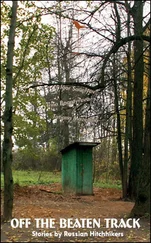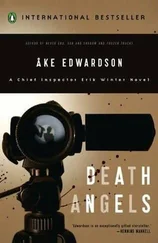He had the photographs on the desk in front of him now. They hadn’t been taken by an expert photographer. Everything was overexposed and slightly blurred. All of them were of children, mostly in a location Winter recognized: the grounds of Elsa’s nursery school. Some of the pictures featured members of staff he knew.
The park, the soccer field. A long line of children.
A man with a video camera could be seen in the background, perhaps thirty meters behind them. His face was hidden by the camera. That particular picture was sharper than the others, as if it had been taken by a different photographer. The man was wearing a cap. Winter couldn’t make out the colors.
The man was wearing the kind of jacket you often see on elderly men who buy their clothes at charity shops. It was impossible to see what kind of trousers he was wearing. More careful copying was necessary, and a bigger enlargement.
Anette had taken two pictures in which the man was visible in the background, but not in succession.
In the second one he had turned his back on the camera and was evidently walking away. The jacket could be seen more clearly. It could easily have been made in the 1950s.
Perhaps the trousers as well. You couldn’t see his shoes, the grass was up to the man’s calves. Nor could Winter see the video camera.
***
“Is it still glued to his face?” asked Halders, who was poring over the photograph. “The video camera, I mean.”
They were meeting in the smaller conference room: Winter, Ringmar, Halders, Djanali.
“It’s not visible,” said Winter.
“He dresses like an old man, but he’s not an old man,” said Djanali.
“What exactly does an old man look like?” Halders asked.
“You’re not going to goad me into going on about that,” said Djanali.
“But seriously, what is characteristic of an old man?” said Ringmar.
“He doesn’t have the bearing of an old man,” said Djanali. “He’s just chosen to dress like one.”
“Clothes make the man,” said Halders.
“The question is what this particular man has done,” said Ringmar, looking at the photograph that could possibly feature the abductor. He felt strangely excited.
“He was filming the children,” said Winter.
“That’s not a crime,” said Ringmar, rubbing one eye. Winter could see tension in Ringmar’s face, more noticeable than usual. “There are normal people who film anything in sight.” Ringmar looked up. There was a red patch over one eye. “He doesn’t have to be a pedophile or a kidnapper or a child molester.”
“But he could be,” said Djanali. “We have a crime on our hands. And he could be the one who did it.”
“We’ll have to work on the picture,” said Winter. “Or pictures, rather. Maybe it’s somebody we can recognize from the archives.”
“The camera looks new. It doesn’t fit in with the dress code,” said Halders.
Nobody was sure if he was being serious or not.
It was so crowded that it was difficult to move your feet. A teeming mass of people, and he was sweating, and if it hadn’t been for that woman with the stroller ten meters ahead of him, he wouldn’t have been here at all, no, certainly not. He’d have been at home, on his own.
It had looked as if the child was sleeping when they were outside the Nordstan shopping center. Then they went inside, the black sea of people walking, walking, walking, shopping, shopping, shopping.
“The day before the day before the day before the day!” somebody yelled, or something of the sort. But what did he care about Christmas? Personally? Christmas was a time for children. He wasn’t a child. But he had been one, and he knew.
It was a good idea. He’d had it before, but now it was stronger than ever. Christmas was a time for children. He was on his own and wasn’t a child. But he knew what children liked at Christmas time. He was nice and he could do everything that would make Christmas really fun for a child. Really fun!
He wasn’t at all sure that the woman in front of him could do that. He didn’t think that the child lying asleep in an uncomfortable position thought she was fun. She didn’t look very fun. He’d seen her before, when she had come to the nursery school and he’d been standing there, watching, or maybe just walking past. In fact he’d seen her several times.
He had seen the boy. And he’d seen a man who might have been the boy’s father.
He’d filmed the boy.
He’d filmed all of them.
The woman had paused outside Nordstan to smoke a cigarette. He didn’t like that. She had jerked her head back and looked as if she were drinking the smoke. He didn’t think that she lived with this child. It might have been her boy, but he wasn’t sure.
Somebody bumped into him, then somebody else. He couldn’t see the stroller, but then it came into view again. He wasn’t bothered about the woman at all, to be honest.
He’d followed them when they left the nursery school. He could come back for his car later.
The weather had turned colder, but he didn’t feel cold. He thought the boy was cold: The woman hadn’t tucked him in properly.
That didn’t matter so much now; it was warm indoors. She was standing in front of one of the department stores that sold everything imaginable. The doors were open and as wide as sluice gates, and people were flooding in and out like torrents of black water, out and in, out and in.
He saw the sculpture, the one he admired. It looked so… so free, so liberated. Sculpted figures flying down from the sky. They were free. They were flying.
He looked around and noticed that she’d parked the stroller by a counter where they sold perfume and hair lotion and lipstick and all that kind of stuff, or maybe it was clothes, but he hadn’t checked very carefully. Yes, it was clothes in fact, perfume was a bit farther on. He knew that really.
He could see the boy’s feet sticking out, or one of them at least. She seemed to be standing there, looking at the boy or maybe something on the floor next to the stroller. Maybe it didn’t make any difference to her. He moved to one side, out of the way of people flooding in and out. He was standing ten meters away from her. She didn’t see him. She moved the stroller closer to one of the counters. She looked around. He didn’t understand what she was doing.
She walked away. He saw her go to another counter, and then he lost sight of her. He waited. He could see the stroller, but nobody else was looking at it. He was standing guard while the woman was away, doing God only knows what.
He kept watch. People walking past no doubt thought the stroller belonged to somebody at one of the nearby counters. Maybe someone who worked there. He looked around but there was no sign of the woman. He checked his watch, but he didn’t know what time it had been when she left and so he didn’t know how long she’d been away.
He took a few paces toward the stroller, and then a few more.
When Ringmar got home he could feel that there was something seriously wrong. Even as he took his shoes off in the hall he could sense that the silence was heavier than usual. He hadn’t heard a silence like that before in this house. Or had he?
“Birgitta?”
No answer, and there was nobody there when he went to the kitchen, up the stairs, through the rooms. He didn’t turn on the lights upstairs as the neighbor’s illuminations were quite enough to fill the rooms with a yellow day-before-the-day-before-the-day-before-the-day glow.
Back downstairs he called his daughter’s mobile. She answered after the second ring.
“Hi Moa, it’s your dad here.”
She didn’t answer. Perhaps she’s nodding, he thought.
“Do you know where your mom is?”
Читать дальше












